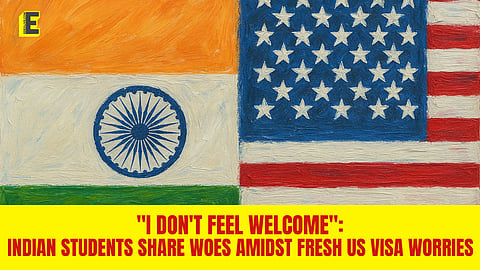

The Government of the United States of America (USA), under President Donald Trump, has been making extensive changes in immigration laws since early 2025, which have caused widespread concern among immigrants and international students, especially from India.
According to a report by the American Immigration Lawyers Association (AILA), about half of the 327 recent visa revocations collected by the organisation have been of Indian students.
Gopal Sharma, a recent graduate from the University of Arizona, shared his opinion about the current situation.
"If you keep to yourself and avoid politics, you'll be safe. But daily life can feel uncertain and sometimes scary because you never know when you might face trouble or pressure," he said.
These changes were implemented through executive orders signed by Trump. They mandate strict vetting, enhanced screening, and possible entry suspensions to protect the US from foreign terrorist and security threats.
The government has expanded the use of "expedited removal", which allows quicker deportation of people who do not have proof of living in the US for more than two years, without even a court trial, leaving many students and workers at immense risk.
For Indian students, these changes mean more scrutiny during visa applications, stricter documentation requirements, and increased anxiety about their legal status.
Students face longer wait times for green cards, more difficult work authorisation processes, and greater uncertainty about post-graduation opportunities.
"I don't feel welcomed by people or local administrations here. The biggest challenge of being here is not having that sense of belonging and not being able to make as many social connections as I'd love to," Gopal expresses his concern.
The heightened presence of immigration enforcement on campuses and in communities has also led to increased fear and stress among international students.
The AILA brief, titled The Scope of Immigration Enforcement Actions Against International Students, highlights that 50 per cent of these students were from India, followed by 14 per cent from China.
"I follow all legal procedures, so the immigration changes should not affect my OPT. However, the tough job market and limited H1B sponsorships make my long-term career prospects uncertain, so I remain hopeful," remarked Ahana Banerjee, another Indian student residing in Boston.
"The graduating class of 2024 faced severe unemployment due to a tough job market, which is only now starting to improve. Citizenship has become a major factor, as many companies are reluctant to sponsor work visas, seeing it as costly and complicated," another student, Dhruthi Darbha, added.
Recent US immigration law changes have created an atmosphere of uncertainty for students, raising their concerns for the future and making it harder for Indian and other international students to study, work, and settle in America.
